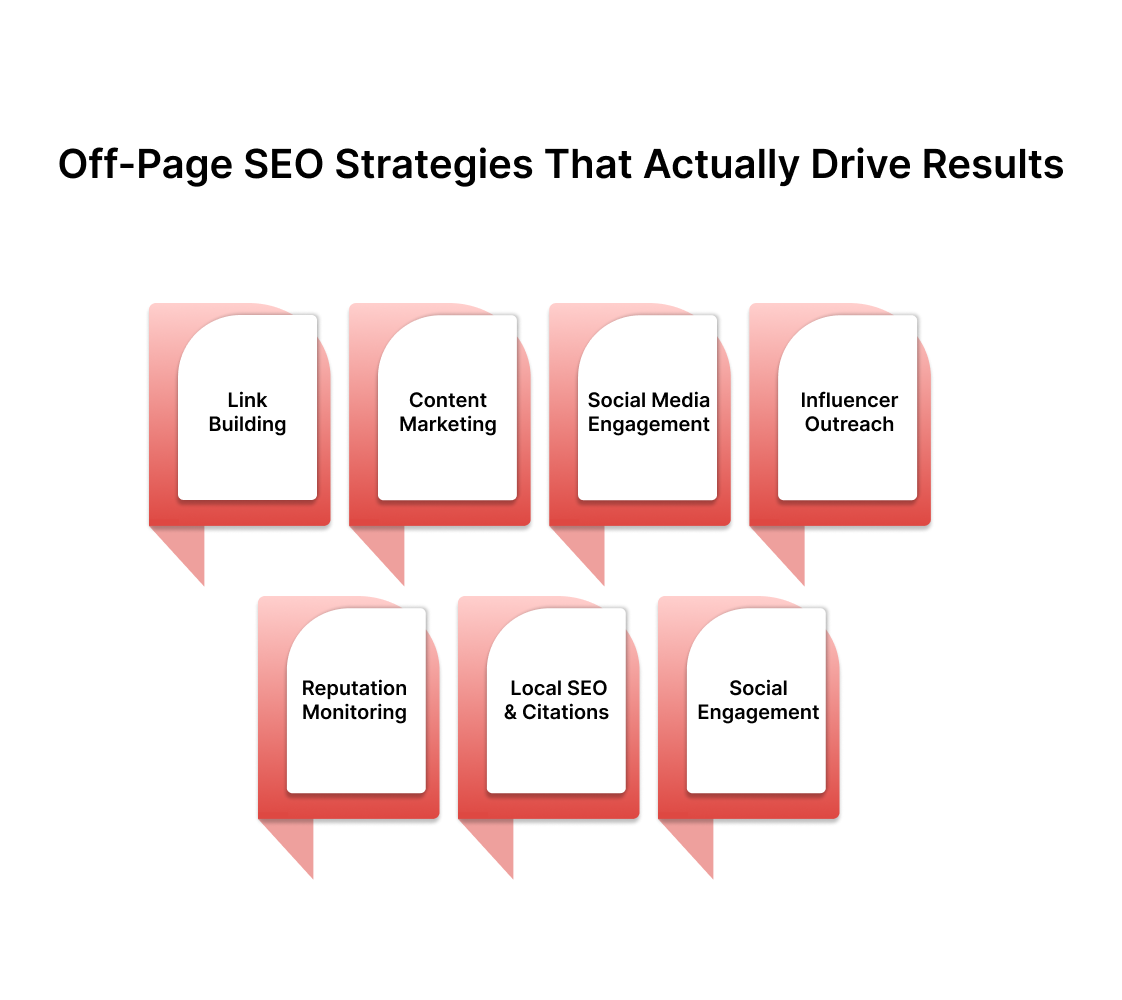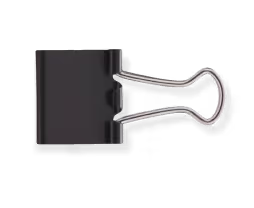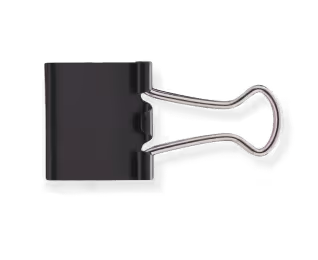Think your website’s content is enough to climb the search rankings? Think again. While on-page SEO shapes what happens within your site, much of your site’s authority and visibility is determined by what happens elsewhere on the internet.
Off-page SEO is the set of strategies and signals like backlinks, brand mentions, and online reputation that tell search engines your site is trustworthy and valuable.
In 2025, mastering off-page SEO isn’t just an option; it’s essential if you want to outrank competitors and earn lasting credibility in your niche. In this blog, you’ll discover what off-page SEO is, why it matters, and how you can use it to power up your rankings.
What is Off-Page SEO?
Off-page SEO is all about improving your website’s reputation and authority by getting recognition from other places on the internet. Instead of making changes on your own site, off-page SEO focuses on how others talk about and interact with your website. This includes things like other websites linking to you, people mentioning your brand, and positive reviews about your business.
Search engines pay close attention to these outside signals because they help determine if your website is trustworthy and valuable to users. The more positive attention your site gets from the wider web, the more likely it is to rank higher in search results.
Knowing what off-page SEO is sets the stage, but understanding why it matters reveals its true value. Here’s why off-page SEO remains a cornerstone of successful digital strategies in 2025.
Why Does Off-Page SEO Matter?
Off-page SEO plays an important role in determining how your website is perceived by both search engines and users. Off-page SEO is about building your website’s authority, trust, and visibility across the entire digital platforms.
1. Boosts Search Rankings: Off-page SEO is a major factor in how search engines rank websites. When credible sites link to your content or mention your brand, it acts as a vote of confidence, signaling to search engines that your website is valuable and trustworthy.
2. Builds Authority and Trust: Search engines use off-page signals like backlinks and brand mentions to determine your site’s expertise, authority, and trustworthiness (E-E-A-T). High-quality, relevant external endorsements help establish your website as a reliable source of information in your field.
3. Increases Brand Awareness and Reach: Off-page SEO activities expand your digital footprint, making your brand more visible across different platforms and channels. This increased exposure not only drives more organic traffic but also helps potential customers discover your business in new places.
4. Drives Referral Traffic: Links from reputable websites can bring targeted visitors directly to your site. Unlike organic search traffic, referral traffic often comes from users who are already interested in your topic, making them more likely to engage with your content or services.
5. Supports Sustainable Growth: A strong off-page SEO strategy creates a self-sustaining cycle: as your site’s authority grows, it attracts more links and mentions, which further boosts your rankings and visibility. Over time, this leads to consistent organic traffic and long-term business growth.
Now that you know why off-page SEO is crucial, it’s helpful to see how it compares to on-page SEO and why both play distinct roles in driving organic growth.
Off-Page SEO vs. On-Page SEO: Key Differences
Understanding the difference between off-page and on-page SEO is key to building a well-rounded search strategy.
On-page SEO involves all the actions you take within your own website to make it more search engine-friendly. This includes optimizing your content, meta tags, headings, internal links, images, and site structure. The main goal is to help search engines understand your site and provide a great experience for visitors.
Off-page SEO, on the other hand, is about everything that happens beyond your website. It focuses on building your site’s reputation and authority through external signals like backlinks, brand mentions, social engagement, and online reviews.
With the differences between on-page and off-page SEO clear, let’s dive into actionable off-page SEO strategies you can implement to strengthen your site’s authority and rankings
If you’re looking to strengthen your website’s technical foundation and on-page optimization, Beetle Beetle specializes in website revamps that set you up for long-term organic growth. Their expert team ensures your site is fast, search-friendly, and ready to convert the traffic your off-page efforts bring in.
7 Off-Page SEO Strategies That Actually Drive Results in 2025

Off-page SEO strategies are the foundation of building your website’s reputation, authority, and visibility in search engine results. Below, each major strategy is explained in detail:
1. Link Building
Link building is the process of acquiring hyperlinks from other websites to your own. These backlinks act as endorsements, signaling to search engines that your content is trustworthy and valuable.
Why is it important?
Backlinks are one of the strongest ranking signals for search engines. High-quality links from reputable sites can drive referral traffic and significantly boost your rankings. Search engines treat each quality backlink as a vote of confidence in your website’s authority and expertise.
How to build links effectively:
- Competitor Research: Identify where your competitors are earning links (industry blogs, directories, podcasts) and pursue similar opportunities.
- Guest Posting: Write articles for reputable sites in your industry to reach new audiences and earn authoritative backlinks.
- Broken Link Building: Find broken links on other websites and suggest your relevant content as a replacement, helping both parties.
- Association Listings: Join industry associations or local chambers of commerce to get listed (and linked) on their websites.
- Natural Link Earning: Create high-quality, unique content (like infographics, research, or guides) that others naturally want to reference and share.
Types of Links:
- Natural Links: Earned without any direct action, when others find your content valuable.
- Built Links: Acquired through outreach and relationship-building.
- Created Links: Self-submitted links, such as directory submissions or forum postings, but these are less valuable and can even be risky if overused.
2. Content Marketing
Content marketing for off-page SEO means creating and promoting high-quality, useful, and shareable content that attracts attention, links and mentions from other sites.
Why is it important?
Great content is the foundation for earning natural backlinks and brand mentions. The more valuable your content, the more likely others are to reference and share it, expanding your reach and authority.
Effective content marketing tactics:
- Guest Posting: Contribute articles to industry websites to reach new audiences and earn backlinks.
- Infographics & Visuals: Create visually engaging content that’s easy to share and embed, increasing the chances of earning links.
- Research & Data: Publish original studies, surveys, or reports that others in your industry will reference.
- Content Repurposing: Turn research into infographics, videos, or press releases to reach different audiences and increase link opportunities.
- Expert Roundups: Participate in or create expert roundup posts, which often get widely shared and linked.
3. Social Media Engagement
Social media engagement involves sharing your content and interacting with audiences on platforms like Facebook, Twitter, LinkedIn, and Instagram.
Why is it important?
While social signals themselves aren’t direct ranking factors, social sharing increases your content’s reach, which can lead to more backlinks, brand mentions, and referral traffic.
Best practices:
- Share content regularly on platforms where your audience is active
- Use hashtags and join relevant conversations to increase discoverability
- Engage with followers and industry influencers to build relationships
- Promote campaigns, events, or new content to boost visibility
4. Influencer Outreach & Digital PR
Influencer outreach means collaborating with individuals or organizations that have significant authority or followers in your industry. Digital PR involves building relationships with journalists and media outlets to earn coverage and backlinks.
Why is it important?
Influencers and digital PR can expose your brand to new audiences, generate high-authority backlinks, and enhance your reputation.
How to approach:
- Identify relevant influencers and journalists in your niche
- Personalize your outreach with newsworthy stories, unique data, or expert insights
- Participate in podcasts, webinars, and industry events to build relationships and earn mentions
5. Online Reviews & Reputation Management
Online reviews are feedback left by customers on platforms like Google, Yelp, and industry-specific directories. Reputation management involves monitoring and responding to these reviews to maintain a positive brand image.
Why is it important?
Positive reviews build trust with both users and search engines, influencing local rankings and consumer decisions. A strong review profile signals reliability and quality.
Best practices:
- Encourage satisfied customers to leave honest reviews
- Respond to all reviews, showing you value feedback
- Keep business information accurate and consistent across platforms
6. Local SEO & Citations
Local SEO focuses on optimizing your online presence for local searches. Citations are mentions of your business name, address, and phone number (NAP) on directories and local business listings.
Why is it important?
Consistent and accurate citations help search engines verify your business information and improve your visibility in local search results.
How to optimize:
- Claim and optimize your Google Business Profile
- Ensure NAP consistency across all listings
- Get listed on authoritative local and niche directories
7. Community Participation & Social Bookmarking
Community participation means engaging in online forums, Q&A sites (like Quora), and industry communities. Social bookmarking involves submitting your content to platforms like Reddit, StumbleUpon, or Digg to boost visibility.
Why is it important?
Active participation builds relationships, earns mentions, and drives targeted traffic. Social bookmarking can help your content reach new audiences and attract links, but it should be done thoughtfully to avoid spam.
Best practices:
- Provide helpful, non-promotional answers and insights
- Share your expertise and link to your content when relevant
- Research each community’s rules and audience before posting
By using these detailed off-page SEO strategies, you can systematically build your website’s authority, trustworthiness, and search visibility, laying a strong foundation for long-term SEO success.
Implementing strategies is only half the battle; tracking their effectiveness is key to ongoing improvement. Here are the essential tools to monitor your off-page SEO performance.
How to Track Your Off-Page SEO Progress
Here are some of the top tools you can use to monitor and analyze your off-page SEO performance in 2025:
- Google Search Console: Essential for tracking backlinks, search performance, and indexing issues.
- Ahrefs: Comprehensive tool for backlink analysis, competitor research, and keyword tracking.
- SEMrush: Robust platform for rank tracking, backlink audits, competitor analysis, and comprehensive SEO reporting.
- Moz Pro: Useful for link analysis, rank tracking, and site audits.
- Morningscore: User-friendly tool for tracking SEO performance, backlinks, and keyword rankings.
- Surfer SEO: Focuses on content optimization and provides insights into keyword performance and backlinks.
- Local SEO Tools (e.g., BrightLocal, Whitespark): Specialized for tracking local citations, reviews, and local search rankings.
- Brand Monitoring Tools (e.g., Google Alerts, Mention): Useful for tracking brand mentions and new backlinks across the web.
While tracking progress helps you optimize, it’s just as important to avoid common pitfalls. Let’s look at mistakes that can undermine your off-page SEO efforts in 2025.
Avoid These Costly Off-Page SEO Mistakes in 2025
Here’s a table summarizing the most common off-page SEO mistakes and why you should avoid them:
Elevate Your SaaS Website’s Potential
Off-page SEO is a critical factor in building authority and driving qualified traffic for SaaS brands. While strategies like link building, brand mentions, and digital PR shape your presence beyond your website, it’s equally important that your site is technically sound and ready to capitalize on that visibility.
Beetle Beetle specializes in B2B SaaS website revamps with a strong foundation in technical SEO, keyword research, and content architecture. Our focus is on ensuring your website is optimized for search engines from the ground up, delivering fast load times, clear site structure, and messaging that resonates with your audience. This approach means that when your off-page efforts start bringing visitors, your website is ready to engage and convert them.
If you’re looking to maximize the impact of your off-page SEO by having a site that’s built for performance and growth.
Schedule an intro call and see how Beetle Beetle provides the expertise that will make your SaaS website search-ready and conversion-focused.
FAQs
1. Why is off-page SEO important for SaaS websites in 2025?
Off-page SEO is crucial because it builds your website’s authority, trust, and relevance in the eyes of search engines. For SaaS brands, strong off-page signals can lead to higher rankings, more organic traffic, and increased credibility with potential customers.
2. Do I need both on-page and off-page SEO for the best results?
Absolutely. Combining strong on-page optimization with robust off-page SEO creates a comprehensive strategy that maximizes your website’s visibility, authority, and conversion potential.
3. How can I track the success of my off-page SEO efforts?
You can track your off-page SEO performance using tools like Google Search Console, Ahrefs, SEMrush, and Moz. These tools help you monitor backlinks, referring domains, keyword rankings, and brand mentions to measure your progress.
4. What are the most effective off-page SEO strategies for SaaS brands?
The most effective strategies include earning high-quality backlinks, guest posting on authoritative sites, engaging in relevant online communities, securing brand mentions, and managing your online reputation through reviews and digital PR.
5. Can off-page SEO help my SaaS website rank for competitive keywords?
Yes, effective off-page SEO can significantly improve your chances of ranking for competitive keywords by increasing your site’s authority and trustworthiness in your niche.
































